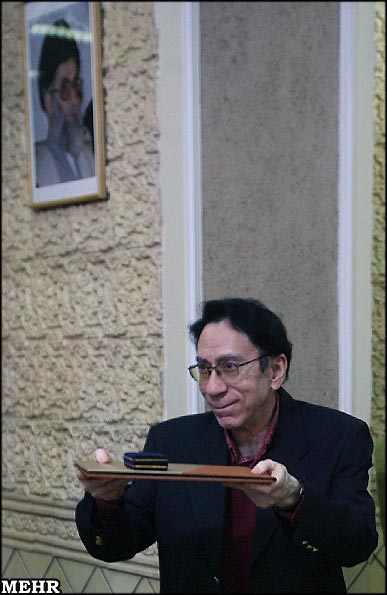Kamancheh virtuoso Darvish Reza Monazami made a speech during the ceremony in which he mentioned that the art of music had been repressed during certain historical eras in Iran, particularly at the time of the Qajar destiny, but musicians had tolerated the situation and had tried to overcome suppression.

He went on to say that Farhat had always been supported and encouraged by his family and that this had been an important factor in his success. He mentioned that he has composed 12 renowned symphonies based on traditional Iranian music.
Musician Kambiz Roshanravan spoke next, saying that Farhat, as well as being a most successful composer, is also a professional pianist. He also explained that his symphonies combine 20th century techniques with traditional Persian music.
“For as long as I can remember Farhat has been active in the field of music. He has made a great effort over the years to create an archive of classical music and traditional Persian music.” he added.
Roshanravan also pointed out that the persistence with which Farhat pursued his career provides a good model for today’s discouraged young people who lack the motivation to advance themselves.
Musician Davud Ganjeii commented that the Iranian Academy of Art should furnish the public with greater information concerning such ceremonies.
Ganjeii added “I believe Farhat’s distinctive characteristic to be that he does not harbor envy towards anyone either in his personal life or in his musical career.”
Sasan Fatemi spoke of Farhat’s ability to harmonize the theme of a composition with its music, and stressed that such an aptitude is essential in the creation of any great musical work.
At the end of the ceremony Shahin Farhat expressed his pleasure at being honored surrounded by such exclusive company, and said that the evening would be an unforgettable event in his life.
Born in 1947 in Tehran, Shahin Farhat is a prolific Iranian composer and is currently professor of music and head of the department of music at the University of Tehran.
Farhat has composed over eighty works including the symphonies “Iranian Lady”, “Damavand”, “Persian Gulf”, “Muhammad (S)” and “Martyrs”.
SB/MA
END
MNA

























Your Comment